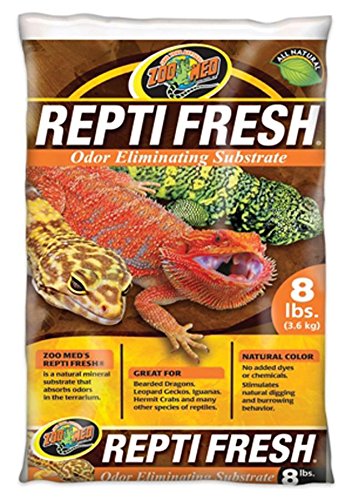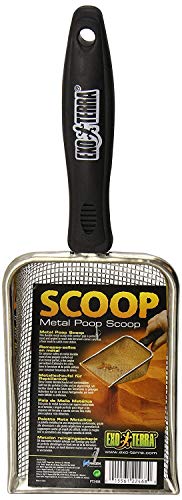Why is it, that often times the smallest creatures can produce the most foul-smelling odors? Seriously!
If it isn’t my bearded dragon’s cage stinking up my whole apartment it’s my cat’s litterbox making me choke when I enter the bathroom. But I digress.
This article is about how to keep a bearded dragon cage from smelling, not the latter. If you want litterbox tips (Hint: it has everything to do with diet) just message me.
Anyways! I’m sure I’m not alone when I admit that my bearded dragon’s cage can be quite the stinky situation.
Luckily for me and my dragon, I’ve discovered some easy little tips and work around for keeping her tank not only spic and span, but smelling great.
Read on if you want to discover what you can do to combat a stinky bearded dragon tank!
In This Article
Why Does My Bearded Dragon’s Tank Smell?
First, let’s examine some of the possible reasons your bearded dragon’s tank smells.
It is important that you have a clear understanding of what is causing the odor so you can be sure to take the appropriate actions that will benefit both you and your pet.
This includes deciphering whether the smell is coming from your actual bearded dragon or their tank.
Continue reading to learn what to do in either instance…
Your Bearded Dragon Actually Smells Bad Him/Herself
As in, he or her actually stinks! There could be several reasons for why your dragon actually smells, including…
- You’re using a loose substrate or paper towels
- They have a fungal infection
In regard to reason A, loose substrates are notorious for trapping odors from urine and poop as they tend to be very absorbent.
For instance, if you are using some type of sand in your dragon’s habitat, even though you might be quick to scoop out poop or urine quickly, it is extremely unlikely that you are able to get every grain of sand that has made contact with the waste.
Because grains get left behind, they not only contribute to a stinky tank but can also transfer odors and bacteria to your dragon when they come in contact with the sand.
I recommend making the switch to non-loose substrates like reptile carpet or linoleum tile instead.
These substrates are a breeze to keep clean and do not trap odors the way loose particle substrates do.
Plus, they also tend to be safer for your dragon (less risk of impaction, eye infections, respiratory issues, etc.)!
You can read more about the best substrates for bearded dragons HERE.
In regard to reason B, fungal infections can cause your bearded dragon to have an odor and can present a whole range of other health issues.
To determine whether your bearded dragon actually smells and potentially has a fungal infection, I recommend giving him or her a nice 20 to 30-minute soak in a warm bath.
If they will permit, brush them gently with a soft bristled toothbrush and maybe use a tiny bit of ultra-gentle baby soap. If your dragon still stinks shortly after emerging from their bath, it is likely there is a health issue present.
If you suspect your bearded dragon has a fungal infection, take them to a reputable reptile vet ASAP for a diagnosis and treatment plan.
Your Bearded Dragon’s Tank Smells Bad
If you feel confident that the smell is not coming from your bearded dragon and is instead coming from their habitat, please consider the following possible culprits of a stinky tank…
- Rotting food/crickets
- Loose Substrate/paper towels
- Their poop has parasites in it
If your bearded dragon’s tank smells, then it could possibly be due to rotting food and/or buried feeders that have been left behind.
Try your best to thoroughly remove all food and feeders that have not been eaten within no more than 24 hours.
Food and feeders left behind will naturally begin to rot and can smell quite awful.
I recommend thoroughly cleaning your dragon’s tank (that is if it’s glass) with a diluted bleach solution every few weeks to ensure you’re removing all bacteria.
Just make sure you wash everything with warm soapy water after the initial bleach, so there are no trace chemicals for your beardie to ingest.
In regard to reason B, as mentioned above, loose substrates and paper towels have a tendency to absorb waste and stay smelly.
Consider switching to a non-particle based substrate if possible.
If you feel that your bearded dragon’s poop is especially smelly, I recommend making an appointment with a reptile vet and bringing in a sample of the stool.
Submitting a sample is usually pretty cheap (like $15-$30 depending on the area) and can help you quickly figure out what’s wrong.
Can I Put Baking Soda in My Bearded Dragon’s Cage?
In short, no.
Baking soda is toxic for bearded dragons and if ingested could pose potential respiratory problems or even death.
Try cleaning your bearded dragon’s tank with a 50:50 water to bleach mix and then once more with warm water to remove any trace bleach left behind.
Remove the old substrate and replace with new, ideally non-particle base.
If this doesn’t resolve the smell then consider any accessories you have in the tank such as hides hammocks, etc. Do they smell?
If so, either clean them or throw away and order new. Lastly, if your tank still smells consider whether it is actually your dragon!
Dragons can develop a funk if they have fungal infections and as such, should be taken to the vet ASAP.
Best Reptile Odor Eliminator
As far as a “reptile odor eliminator” goes, you’re going to have several options depending on cage setup.
Read on to discover the top picks for odor eliminators for both a particle and non-particle based substrate!
Best Reptile Odor Eliminator for Particle Based Substrate Habitat

If you are using some type of sand, then the ReptiFresh Odor Eliminating Substrate will work great.
Simply mix it evenly with your regular substrate and fill the dragon’s cage.
For a 40-gallon tank, I recommend 1 bag of ReptiFresh, and for anything over that 2 bags. Tanks that are above 100 would be best with 3 bags.
ReptiFresh works similarly to odor blocking kitty litters, except it doesn’t have to be changed for anywhere from 6 to 12 months.
However, I do recommend changing it every 6 months as an entire year is quite a long time to let any loose substrate sit.
I also recommend investing in a scoop such as the one pictured below that will make cleaning out poo really easy.

*Note: Please do not use ReptiFresh in juvenile bearded dragon tanks as juveniles are known for getting a mouthful of substrate when they hunt.
In fact, please do not use any loose substrates (i.e. sands) with juveniles as this can lead to impaction and other issues.
Best Reptile Odor Eliminator for Non-Particle Based Substrate

If you aren’t using particle based substrate, consider checking out the Zilla Reptile Terrarium Bedding Substrate Liner.
This liner is amazing because it doesn’t trap and hold odors like traditional substrates, and is also very safe for bearded dragons of all ages.
Made from absorbent, nonabrasive material, this liner is easy to either spot clean or throw into the washer.
Simply cut it to fit the bottom of your dragon’s vivarium and you’re good to go!
Best Reptile Odor Eliminator for In Between Tank Cleanings

Now, if you’re set in your ways about your dragon’s substrate but still need something to eliminate the odor coming from their tank, fear not!
This solution from No Scent contains ZERO harmful chemicals, and is specifically targeted to combat the odors from reptile waste and urine.
The enzymes in the solution work to break down odor upon contact, and remain working long after application.
And because this product is natural, biodegradable, and 100% environmentally friendly, you can actually spray the solution into the tank without having to wipe down!
Even with your bearded dragon inside the tank as well! Super convenient.
Conclusion
So, there you have it! I hope this article proved helpful in helping you determine not only some possible reasons your bearded dragon’s tank has been smelling, but also in determining some solutions for remedying the funk!
If you have a favorite way to eliminate the odor commonly associated with a reptile tank, please leave it in the comments below!




